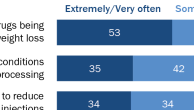Susannah Fox will serve as a discussant on a panel focused on mobile health technology and adolescent populations from different cultural backgrounds at the 2010 mHealth Summit in Washington, DC. Health disparities and reaching under-served adolescents with mobile technology will be a central theme.
The following researchers will present their findings:
- Alastair Charles van Heerden, MSc: Message Delivery Pending: Opportunities And Challenges Facing The Collection Of mHealth Data From A Cohort Of Young Adults In South Africa (South Africa)
- Fiona M. McTavish, M.S.: Lessons Learned: A Smart Phone Intervention for Inner-city Teens with Moderate to Severe Asthma (USA)
- Melissa S. Stockwell, MD, MPH: Text4Health: Text Message Reminder-Recalls to Improve Pediatric and Adolescent Immunization Coverage (USA)
- Dr. Tamir Miloh: Improved adherence and outcome in pediatric liver transplantation recipients following text messaging (USA)
- Ms. Uju Ofomata, MBA, MPH: Using Cross-Media Technology to Empower Young People with Sexuality Information (Nigeria, Senegal, Mexico, Morocco)
Heather Patrick, Ph.D., Health Scientist Adminstrator, National Cancer Institute, will serve as moderator.
Selected abstracts:
Title: Message Delivery Pending: Opportunities And Challenges Facing The Collection Of mHealth Data From A Cohort Of Young Adults In South Africa
Corresponding Author: Alastair Charles van Heerden
Abstract: In 1990 Birth to Twenty, a longitudinal birth cohort study based in Soweto-Johannesburg, enrolled 3 273 newborns and their families in a study to track child health, growth and development through childhood and adolescence. As the cohort leaves school and begins to move away from home, alternatives to current home and facility-based data collection practices are needed. One possible approach is a mobile phone data collection platform. Nokia 2600 classic handsets, loaded with the Mobile Researcher J2ME survey application, were distributed among the cohort. This study describes our pilot attempts to collect psychological, social and physical health information from cohort members using mobile surveys. A sample of 435 participants was randomly selected to pilot the mobile survey. The Short Messaging Service (SMS) was used to alert recipients to the arrival of surveys and to provide general instructions. Participants were required to download, complete all items and upload their survey response. Of the 435 sampled, 288 (66%) successfully received the SMS instructions. Within two weeks 152 surveys had been uploaded. Ten weeks after the initial SMS, returns to the original survey continue to be received. On average participants took 21 minutes to complete the 60 item survey. Ten participants (6.6%) broke off the survey before completion. Additionally, participants skipped 653 of the 9120 items (7.16%), with numeric fields most likely not to be answered. Most participants (70.12%) completed the surveys at home, with the remainder completing the surveys either at school, work or in a public space. It is clear that despite the challenges, for example having phones lost and stolen, collecting health data from young adults in South Africa holds potential.
Title: Lessons learned: A smart phone intervention for inner-city teens with moderate to severe asthma
Corresponding Author: Fiona M. McTavish
Abstract: Numerous clinical trials have shown that the Comprehensive Health Enhancement Support System (CHESS) computer based program has improved the quality of life for people dealing with life threatening or chronic diseases. Based on the Self Determination Theory, CHESS services are designed to increase autonomy, competence, and relatedness. This study adapted CHESS to a smart phone application (called MCHESS) for underserved teens with moderate to severe asthma in inner-city Milwaukee. MCHESS featured a weekly check-in to monitor asthma symptoms, frequently asked questions, video personal stories, access to a case manager from their HMO, discussion groups and a teen “facebook” type wall. This study involved 216 teens (age 12 to 17) and their parents/guardians. Participants were randomly assigned to: 1) Usual Care + a Smart Phone, or 2) Usual Care + a Smart Phone with access to MCHESS. This talk/poster will describe unanticipated events resulting from this study and the implications for researchers and healthcare providers. The three major areas that will be addressed include operational issues, technological considerations, and unanticipated events from providing teens with smart phones. For example, under operational issues, in our study over 50% of the phones had to be replaced because they were lost, stolen, or broken (216 study participants – 330 phones given out). While replacing phones is relatively inexpensive (but must be adequately planned for within the budget), stopping service, replacing phones while retaining the phone number, and ensuring that the billing reflects these changes is extremely labor intensive. More serious issues involving study participants’ safety (such as sexting) and the researcher’s ethical responsibility will also be discussed.
Title: Text4Health: Text Message Reminder-Recalls to Improve Pediatric and Adolescent Immunization Coverage
Corresponding Author: Melissa S. Stockwell
Abstract: Traditional immunization reminder-recall mechanisms have had limited effectiveness among adolescents and economically disadvantaged populations. Text message reminder-recalls are a novel approach to remind patients and parents about immunizations. Therefore, the purpose of this study was to determine the efficacy of text message reminder-recalls for adolescent immunizations in an urban population. We conducted a randomized intervention with adolescents (n=195) and age- and gender-matched controls (n=166) in need of meningococcal (MCV4) or tetanus, diphtheria, acellular pertussis (Tdap) vaccinations. Utilizing a text messaging system linked to our immunization registry, parents of intervention adolescents received a series of automated, personalized immunization reminders. Messages were developed based on community focus groups, and included the adolescent’s first name and clinic name. Messages were sent in English or Spanish according to recipient’s language preference. Primary outcomes were receipt of MCV4 or Tdap at 4 and 24 weeks post randomization, assessed using Pearson’s chi-square test. Logistic regression assessed the impact of age, gender, race/ethnicity, insurance, and language.
Families were primarily Latino (58%) and had Medicaid (75%). 821 messages were sent. Seven bounced back, 5 were wrong numbers, and 5 recipients opted out. The median number of messages sent before receipt of immunization was 3, interquartile range = 2. Using intention to treat analyses, there was a 10.7% (95% CI, 4.8 to 16.5) point difference in receipt of MCV4/Tdap vaccine at 4 weeks between intervention adolescents and controls (14.9% vs. 4.2%; p< .01). At 24 weeks, there was a 17.9% (95% CI, 9.1 to 26.8) point difference (35.4% vs. 17.5%; p<.001). Intervention status was still significant after controlling for demographic factors (4 weeks: AOR 4.41, 95% CI, 1.76 to 11.03; 24 weeks: AOR 2.48, 95% CI, 1.48 to 4.15). Immunization registry-linked text messaging was efficacious in promoting immunization delivery in a low income, urban, adolescent population.
Title: Improved adherence and outcome in pediatric liver transplantation recipients following text messaging
Corresponding Author: Tamir Miloh
Abstract: Non-adherence with medication is prevalent in 40% of adolescents liver transplant (LT) recipients and is the leading cause for late graft loss. The goal of the study was to improve immunosuppressant adherence by using text messaging (TM) reminders to the cell-phone of the primary medication administrator (patient or caregiver) for children after LT. The study was approved by Mount Sinai Hospital IRB and required both patient and caregiver consent. TM was sent at a pre-determined time. Patients were required to confirm medication intake by reply TM. In cases of patient non-response, an alert was sent to the caregiver. Patient records were reviewed, comparing the year before and the year of the intervention. Serum tacrolimus SD was an indicator of adherence. Forty-one patients with median age 15y (range: 1–27y) were enrolled. Median LT age was 2y, 85% were non-Caucasian and 14 were male. In 32/41, medications were self-administered by the patient. The mean duration of study was 13 months. Mean tacrolimus SD decreased from 3.46 before the study to 1.37 (P <0.005) and was significant in patients taking any number of immunosuppressants and if medications were administered by either self/caregiver. The number of acute cellular rejection decreased from 12 to 2 during the study. The study was published in Pediatrics. In conclusion, we observed significant improvement in medication adherence and a reduction in rejection episodes with TM reminders for pediatric LT recipients.
Title: Using Cross-Media Technology to Empower Young People with Sexuality Information
Corresponding author: Uju Ofomata
Abstract: Accurate and non-judgmental information about human sexuality is largely unavailable to adolescents in most developing countries. In many places, age-old taboos make discussion of sexual health impossible, and generations have grown up ignorant of vital information that can make or break one’s future. As a result, tens of millions of young people are more vulnerable than they need to be in countries where the average age of first sexual activity is often as low as 13 or 14, hundreds of thousands of children are living with HIV, maternal mortality rates are unconscionably high, and STIs thrive. Mobile phones, because they are anonymous and discreet, allow young people to finally ask the questions about sexual and reproductive health that they never dared speak at home or at school. The “My Question” service provides a number that anyone can text or call – anonymously. The “My Answer” service takes the process a step further, encouraging youth to engage more deeply on sexual health issues by offering a chance to win prizes for correct answers to monthly questions. It also exposes critical gaps in understanding on key issues, which can then be addressed by local NGOs and educators. “MyQ” and “MyA” are part of a project called “Learning about Living,” which also includes an eLearning platform used in schools and youth centers. The project proved extremely popular during its pilot phase, with over 60,000 questions submitted via mobile phone during the first 15 months of operation and users reporting overwhelming satisfaction. As a result, a scale-up and sustainability phase is now underway in Nigeria, and approximately 8,000 questions are now being received by SMS each month. An extension of the project is also about to launch in Senegal (September 2010), and feasibility studies are being conducted in Mexico and Morocco. Organizations and government entities in several other countries have expressed interest as well.




